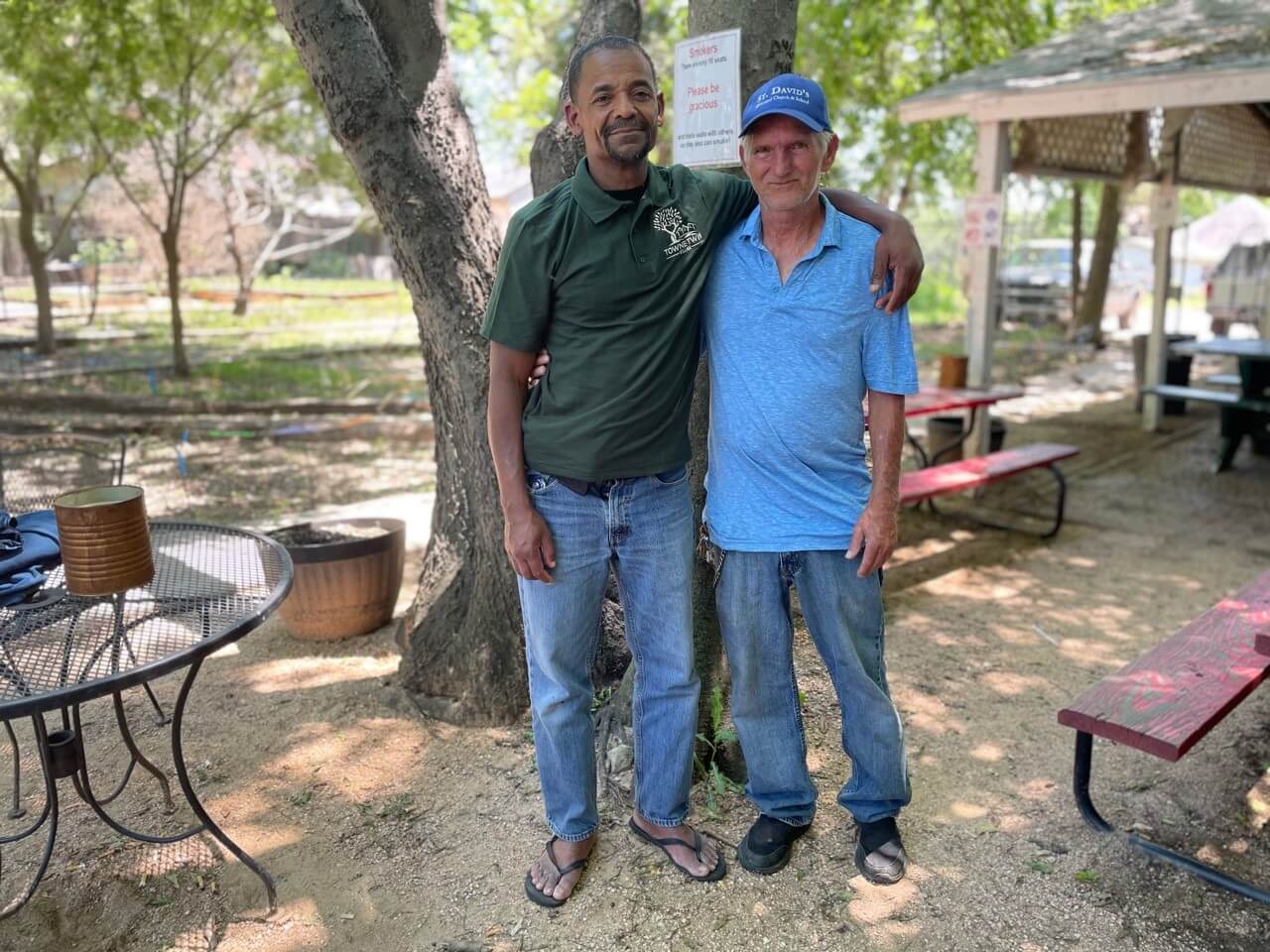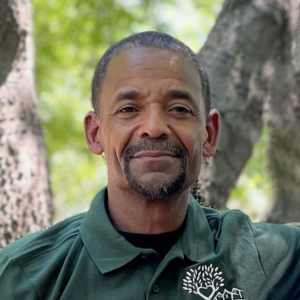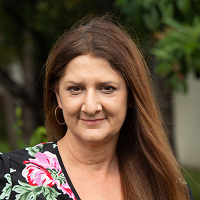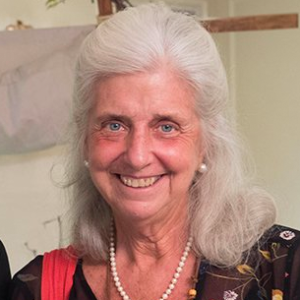Housing First Community Coalition (HFCC) Board Member and former Catholic Worker House staff volunteer Aaron Green cares deeply about fellow staff members and clients, both formerly and currently homeless. He greets old friend Robert, who assumed some of Aaron’s duties at Catholic Worker House when Aaron left and found employment.
Caring for Others Inspired Once-Homeless Man to Kick Decades-Long Cocaine Habit
Aaron was inspired to kick a decades-long cocaine habit when he cared for a 92-year-old man who was allowed to die with dignity in an apartment owned by San Antonio Catholic Worker House.
Talking with the well-groomed, thoughtfully-articulate, athletically-built man, you would never discern that he spent years living on the streets battling 30-years of off-and-on addiction to crack cocaine. Aaron Green has been clean for years and holds a steady job driving laborers. Recently he was chosen to represent residents on the Board of Housing First Community Coalition (HFCC), as the group develops the new Towne Twin Village to house seniors who are currently homeless. Peers from San Antonio Catholic Worker House asked him to be their voice because of his changed life demonstrated by compassionate service to others.
Prior to landing in San Antonio, Aaron had bounced around the state, looking for a fresh start whenever his circumstances would take a downturn. That’s how he ended up at Catholic Worker House in 2012. He met up with a buddy who told him that Catholic Worker House was a place where he could find a hot meal, clean clothing, and a place of respite during the day to get off the street. Clients gather at picnic tables on the shaded patio or watch movies in the day room. “The doors are always open, and people are in and out,” Aaron said.
“Sometimes close to 100 people sit, play dominoes, or listen to the radio without worrying about people telling them to get off their property.”
Aaron liked the place so much he started pitching in. “I had hair clippers and started cutting hair for free,” he said. Others noticed his can-do spirit and asked him to join the volunteer staff, a position he eagerly accepted. Not only did the job come with a small stipend, it allowed Aaron to move out of the Men’s Rescue Mission and into a room in the small house that staff members share. He helped with maintenance, mowed the lawn, and served food – becoming so proficient at making coffee he became known as “The Coffee Man.”
Aaron will never forget the day Urusolo arrived at the Catholic Worker House. The 92-year-old had been released from Haven for Hope under Hospice care. He had no records, no family. Urusolo needed a place to live out his last remaining days with dignity–but where? Catholic Worker House provided a small apartment for him and his caretaker in the staff house. The roommates were getting to know each other when Aaron noticed Uruselo had been left alone lying in filth in his bed all weekend. His heart broke for his new friend. From then on, Aaron became Urusolo’s caretaker. He cleaned him, fed him, read the Bible to him for hours on end, and held his hand. Aaron was with him just a few short hours before Uruselo died and deeply treasures knowing he allowed the older man to finish well and in peace.
“Every time I’d come into his room, he’d smile,” Aaron said. “I never thought I’d be able to do something like that.”
Aaron checked himself into the Salvation Army ARC in 2017 to kick cocaine for good. Now he works transporting day laborers to job sites while living in a bunkhouse for men near downtown, where he earns his keep cleaning the place during nights and weekends. He eagerly anticipates the move to an apartment at Towne Twin Village. He is keenly aware of the value of having one’s own space.
“When you stay at Haven for Hope or communities, you eat, sleep, bathe, always with multitudes of people around. I’m excited about moving,” he said. And, as a Board member, he’s looking forward to being a voice for the residents on the Board and “volunteering to do some things.”
“People on the streets will actually have their own little apartments,” he said with pleasure. “They will have their own key and go into their own place. They can go lay down whenever they want to – go shopping – which pretty much doesn’t exist for homeless people. It’s not like you have a refrigerator. You survive day by day.”
He elaborated, “To see people be able to stick the key inside their own place without anyone saying, ‘get out!’ No one can tell them that. They have their own control to be able to go into their own place and not worry about their things being stolen or thrown away.”
“It gives people a lot of self worth to be put in a position where they are responsible for themselves, but with the amenities there to live as a normal person. They don’t have to travel up the street to find out where they are going to eat or lay their head today.”
Words of experience from one who was once lost, but now is found.












